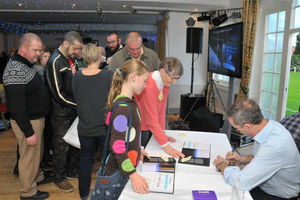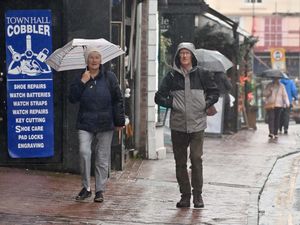Ground control to Major Chris . . . it's the singing astronaut in Shropshire
[gallery] Chris Hadfield, known around the world as "the singing astronaut", recalls an encounter with a car park attendant from the night before, as he addresses a mesmerised audience at a Shropshire hotel.
"I was at this car park in Manchester last night, and the man comes up to me and says 'hey, you're the Space Oddity guy, aren't you?," he says.
"I say 'Yes', and then I'm thinking, 'Hang on a minute, I commanded a spaceship."
It is undoubtedly true that, for all his accomplishments during an illustrious career in both the Canadian military and with Nasa, it was his extraterrestrial rendition of a David Bowie cover that makes him probably the most famous living astronaut after Buzz Aldrin.
But for a man who has spent most of his life preparing for every eventuality, he does seem slightly surprised at the way this performance, which he made as he readied himself to return home from the International Space Station, has turned him into an global phenomenon. The clip, which shows him strumming away at his guitar, has been viewed 20 million times on YouTube.
"I've played the guitar since I was a kid," he says. "I take my guitar everywhere I go, so it was only natural I would take it with me."
Hadfield, who is now 55, told an audience at Oswestry's Wynnstay Hotel how it was his son Evan who persuaded him to perform Bowie's melancholic song from 1969 to his audience on social media.
"My initial thought was 'why would I want to do that'," he says.
"Major Tom dies at the end of the song, and I'm still alive, but then I thought I could do a slightly different version of it where Major Tom survives."
Like many of his generation, Chris became fascinated by space travel as a youngster, having grown up on a diet of Arthur C Clarke novels and early episodes of Star Trek.
However, it was the moon landings of 1969 which convinced him that he really wanted to be an astronaut.
"I was fascinated by the way the impossible became possible," he says.
"On the morning of July 20, it was impossible to walk on the moon. By the evening of July 20, man could not just walk on the moon, but could sleep on the moon, and that happened because of the incredible drive of man's labour."
Hadfield, who was in Oswestry at an event organised by the town's Booka bookshop to promote his new book You Are Here, describes man's fascination with life beyond this planet as the natural progression from the great pioneering explorers of centuries gone by.
"It's how we have explored the earth for around 7,000 years, it's how there's people in the Americas now, it's how we have people living all over the world."
However, he says an astronaut's life is far from that of the gung-ho adventurer. "If the only thing you really enjoyed was whipping around Earth in a spaceship, you'd hate being an astronaut," he says.
"When I was nine years old, I dreamed of blasting off in a blaze of glory to explore the universe, not sitting in a classroom studying orbital mechanics. In Russian."
He says being an astronaut is as much a state of mind as anything, preparing for every possible outcome, when every action can be a life-and-death decision.
Speaking just before he takes to the stage, he explains: "For example, I'm just about to give a talk. So what is the most likely thing that could go wrong? The sound system could fail. So what can we do if that happen? Do we need a back-up system? What is the next most likely thing that could go wrong?"
Indeed, in his 21-year career as an astronaut, he has spent just 166 days in space, with the rest of his time dedicated to study, training and preparation.

"Astronauts are not adrenaline junkies," he says. "You have to be willing to train repetitively on safety procedures on board the International Space Station even though you think you know them inside out. You have to accept that you'll need to master a lot of skills that seem arcane, or that you might never even get to use, or both. And you can't view any of it as a waste of time."
It is this mindset which meant he had little fear when he was blasted into the sky on his first space flight aboard Space Shuttle Atlantis in 1995.
"You're strapped into a chair lying on your back, you're about to be blasted into the air at 17,500mph," he says. "That is blisteringly fast, it's like going around the word in 92 minutes, or from here to Winnipeg in 13 minutes.
"It takes eight-and-a-half minutes before you leave the atmosphere, and that is the most dangerous eight-and-a-half minutes of your life
"In that eight-and-a-half minutes there are so many things that can go wrong, and all that time you have to focus on how you are going to deal with anything that comes along."
And he says while everyone who travels into space will feel some fear during those crucial first minutes, he says it is also a time of great exhilaration. "After my first blast-off in 1995, my face was hurting, I didn't realise it was because I had been smiling so much," he says.
During his second flight in April 2001 he became the first Canadian to leave a spacecraft and float freely around space. During the 11-day expedition he performed two space walks, travelling 10 times around the world in just under 15 hours.
"It was an incredible feeling, there is nothing like it, having just a perspex visor separating you from the whole of the world," he says.
He likens the night before his first space walk to a child going to bed on Christmas Eve.
"I wanted to get to sleep right away, to make the morning come faster," he says.
He says there is no experience which can compare with stepping out of the spacecraft.
"It's like being engrossed in cleaning a pane of glass, then you look over your shoulder and realise you're hanging off the side of the Empire State Building, Manhattan sprawled vividly beneath you.
"It's not like a globe, all shiny, with all the countries in different colours, it's vivid, brightly coloured, you can see the borders between different countries by their irrigation systems."





